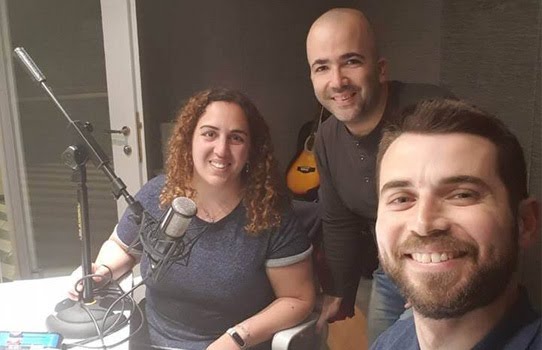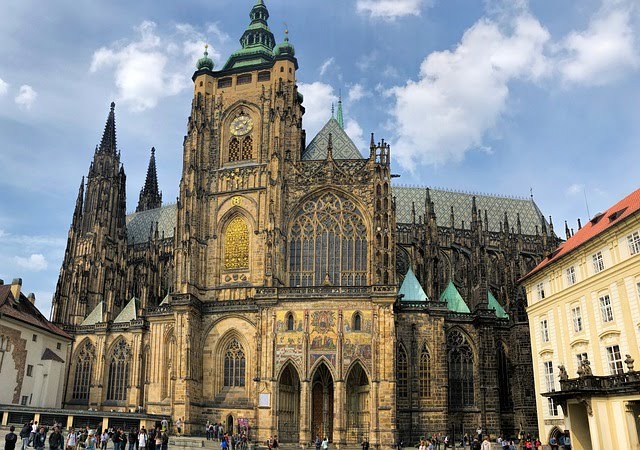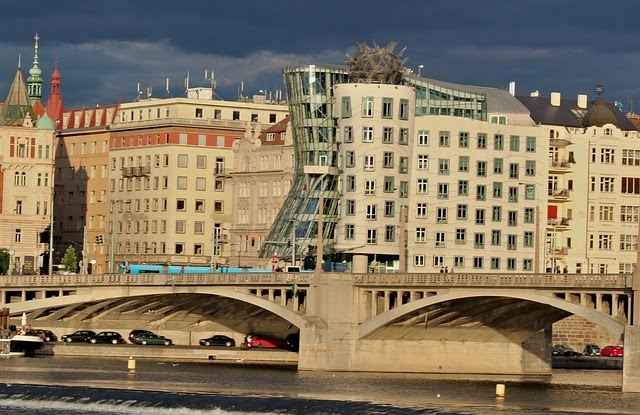Our VP of Marketing is a guest on the podcast “Real Estate Without Borders”, sharing practical tips for investing in real estate in the Czech Republic.

In January 2019, Mr. Shauli Cohen, VP of Marketing at Conbiz, was a guest on the “Real Estate Without Borders” podcast, which focuses on international real estate investments. The interviewers who spoke with him about real estate investment in the Czech Republic were Mr. Max Friedman and Smadar Hayek Ganon. You can listen to the episode here.
For those of you who prefer reading the key insights from the interview, we’ve included the full transcript here. Enjoy and be inspired.
Max: Hey everyone, this is Max Friedman and Smadar Hayek-Ganon, and you’re listening to “Real Estate Without Borders” – a podcast about international real estate investments. Today, we’re joined by Shauli Cohen from Conbiz, a company involved in real estate across the Czech Republic, especially in its capital city, Prague. Conbiz has two offices – one in Israel, led by Shauli, and the other in Prague, managed by Amos Ozen, the company’s CEO, who has been living in Prague with his family for over ten years.
In 2009, Amos moved to Prague and worked at the Israeli embassy in the Czech Republic. There, he realized there were no solid solutions for investors looking to enter the local market, and that’s how Conbiz was founded. Originally, it began as a consulting and business development firm. In fact, the name “Conbiz” is short for Consulting Business. At first, Shauli and Amos invested in real estate for themselves. Over time, clients joined in on the investments—and the rest is history. The company went through a kind of pivot and began focusing primarily on real estate investments in the country.
Max: Very, very impressive, Shauli. First of all, thank you so much for being here. I think we should just dive right in and get started.
Smadar: So first of all, hello Shauli.
Shauli: Hey there.
Smadar: We’d love it if you could give us some background on the real estate market in the Czech Republic—neighborhoods, types of properties, prices, and demand.
Shauli: Okay, so broadly speaking, I divide the Czech Republic into two parts. The first is Prague. About a third of the country’s population lives in or around Prague. The rest live in small and medium-sized towns. But by far, Prague is the largest and most significant city—it’s the business center of the Czech Republic.
Prague is very special. It’s a major business and tourism hub for the country. The infrastructure is well developed—Western European level. The municipal system is very similar to Western Europe’s. There’s a very high percentage of English speakers, and salaries are relatively high—certainly compared to the rest of the Czech Republic.
We divide Prague into three main parts. First, there’s the Old Town—the tourist district. Almost 99% of everyone who has visited the Czech Republic has been there. It’s somewhat reminiscent of Jerusalem’s Old City—several square kilometers of historic buildings and picturesque streets.
Then there are the surrounding neighborhoods. Let’s say neighborhoods within a 20-minute radius by public transport from the Old Town center. By the way, Prague’s public transportation infrastructure is very advanced. Most residents don’t own a car—just like in Tel Aviv. Everyone uses public transportation, which includes the metro, trams, and even ferries—or rather, boats—on the river, traveling from one end to the other.
Smadar: Do those boats also connect the outer neighborhoods to Prague, or are they just within the tourist area?
Shauli: No, not just the tourist area. Along the river, there are various stops where ferries or boats transport people from one side to the other.
Smadar: Okay.
Shauli: The third part is everything else—the outskirts of Prague. Around Prague, there are luxury neighborhoods, as well as less desirable areas. In terms of prices, the most expensive real estate area in the entire Czech Republic is the Old Town of Prague. For example, a 50 sqm apartment there costs around 1.1 to 1.2 million shekels. In one of the better residential neighborhoods about 20 minutes away, similar apartments go for about 600,000 shekels. You can find cheaper options, but they usually come with trade-offs like being farther from the center or in less appealing areas for investors.
Smadar: Okay.
Shauli: We mainly focus on two primary areas: the first is small apartments—30–40 square meters, 50 square meters—whether they are in the city center, the Old Town, or in the city’s better residential neighborhoods. The second focus is buildings. Today, you can find really great opportunities in buildings that haven’t gone through the parcelization process in the land registry. You can buy them, renovate, or expand.
Max: Can you briefly explain what parcelization is?
Shauli: Yes.
Max: For the benefit of the listeners.
Shauli: When I buy an apartment in a building today, it means the building has gone through a process with the land registry in which it was divided into sub-parcels—individual units. In Prague, for example, there are still buildings where the land registry doesn’t recognize their division. That means the land registry lists a 700 square meter building as a single block. What often happens in order to sell it to several families is that it’s divided in the registry, and then each unit can be sold individually.
Max: So basically, each unit is an apartment.
Shauli: Each unit is an apartment. Yes.
Smadar: Is there encouragement for this kind of division, for parcelization?
Shauli: I don’t know if I’d say it’s encouraged, but it’s just a bureaucratic process you have to go through. Even today in Israel, a contractor who buys land and builds a building on it must go through the parcelization process eventually.
Smadar: The question is whether it’s seen as a problem you’re helping them solve, or if they don’t really care?
Shauli: On one hand, I’m not aware of any difficulties, but on the other, I don’t see any encouragement either.
Smadar: Got it. Okay.
Max: Okay. We talked about how in the Old Town it’s more profitable to rent short-term to tourists, and in the surrounding neighborhoods long-term rentals are more attractive. So I wanted to ask about the Czech government’s policy regarding Airbnb apartments, especially since we’re seeing more and more news about countries starting to ban this phenomenon.
Shauli: As of today, Airbnb is legal in the Czech Republic. There are even two municipal portals that allow property owners to register these units as vacation rentals. I don’t know what the future holds, but it’s not something that’s being heavily discussed at the moment.
Max: Do they handle it differently, or is it considered regular rental income?
Shauli: There is a specific tax route that’s still quite attractive and interesting.
Max: I see.
Smadar: And is Airbnb management typically handled by local companies?
Shauli: Airbnb management is usually done by local companies that specialize in Airbnb and tourism. Their fee is around 20% of the income.
Another model is renting these apartments to such companies for a fixed price—lower than what I’d earn renting to tourists directly or through them. These companies then sublet to tourists.
Smadar: That gives more peace of mind…
Shauli: More peace of mind. Yes, exactly.
Max: It’s a fairly common model in tourism—some company comes to you and says, “Shauli, how much do you want monthly for this apartment?” You say, for example, 500 dollars. They sign a contract with you, you receive 500 dollars every month, and they rent it to tourists. Their profit is the difference between what they pay you and what they earn from the tourists.
Shauli: Usually these leases are for longer than a year—say two years or more. Contracts are signed, and it’s very convenient.
Smadar: With a tourism company?
Shauli: With a tourism company.
Smadar: Okay.
Shauli: Yes.
Max: You said something interesting during the prep about new apartments from contractors—that they’re delivered without kitchens, and sometimes the seller even takes the kitchen if they brought it in.
Shauli: Okay, let me clarify. In Prague, in the Czech Republic, new apartments from contractors are delivered fully finished, but without a kitchen. And with second-hand apartments, especially those that were recently renovated or beautifully furnished, you need to check whether the kitchen is included. No surprises.
Max: I see. So it’s something worth asking the seller about in advance?
Shauli: Definitely worth asking.
Max: “Is the kitchen included or not?”
Shauli: That’s a very legitimate question. Yes…
Max: Great! Let’s move on to the next question. If you could tell us a bit about the niches you work in—you started talking about it but maybe expand a bit more on what drew you to these specific niches?
Shauli: So as I mentioned earlier, we specialize in two main niches: the first is small apartments—even very small. The smaller, the better, in our view.
Max: How small are we talking?
Shauli: Could be 30 square meters. These provide the highest returns and rent out the fastest. The typical household in the Czech Republic is small—couples, or couples with one child. Couples with three kids are rare. Due to demand, it’s easy to select tenants and prefer the ones we believe are better tenants.
The second niche is buildings. There’s a lot of room for creativity when buying buildings. There’s also significant profit for investors. We’ve had building deals with equity returns close to 100% in two to three years.
The model is very simple: buy a building, expand it, renovate it. In cases where parcelization is possible, we do it and then sell unit by unit. This cycle takes one to three years, depending on the building. Often, we finance the purchase and sometimes even the renovation and expansion using 70% financing from a local bank. That way, the return on equity is very high. In some cases, the financing is in the form of a balloon loan, so we only pay interest during the period.
Max: So you’re not paying the principal, only the interest for the period you agreed on.
Shauli: Exactly, and the principal at the end—upon sale.
Max: And do you usually… do you work with purchasing groups for these buildings? Like you recruit multiple investors to buy the building together, or how does that work?
Shauli: We work with one person or one entity. Who’s behind them? Could be 10 people. We don’t organize these purchase groups. We have people we work with, and I know some of them have several investors behind them. In some cases, especially larger projects, we as a company also enter as joint investors—but not in every project and not with just anyone.
Max: Are you buying existing buildings or developing new ones as developers?
Shauli: We only buy existing buildings.
Max: Existing buildings. You renovate them, parcelize…
Shauli: Parcelize, do some kind of value-add, and then sell.
Max: Sell the whole building?
Shauli: Sell the whole building. Depends on the investor. Some even prefer…
Max: To hold onto the assets?
Shauli: Prefer to buy, renovate, and continue holding.
Max: Continue holding.
Shauli: Depends on the model. Every building is a completely different business plan.
Smadar: And what’s the usual cost of a deal like this? For a building?
Shauli: Starting from 5 million shekels—let’s say a little over 1 million euros. You need to be able to bring at least 1.5 million shekels in equity to start hearing offers.
Smadar: And do you know how many units there are in such a building worth a million euros?
Shauli: It really varies. It really varies because properties in Prague are very expensive. But we also do buildings in other places like Plzeň, where prices are much cheaper compared to Prague.
Max: Actually, I wanted to ask you—we’ve been talking a lot about Prague. Can you explain a bit about Plzeň? What did you find there, how did you get to that area, and what makes it unique?
Shauli: Yes. Plzeň is one of the biggest cities in the Czech Republic—around 180,000 people. The fourth largest city in the Czech Republic. A few years ago, it was named the European Capital of Culture. The city has a very large university center. It’s home to Skoda factories and Pilsner beer factories. Just an hour’s drive from Prague on a straight highway—very accessible. It’s also close to Germany, halfway there.
Max: And how did you get into real estate there?
Shauli: In the beginning, we worked in various parts of the Czech Republic, and over time we realized we were focusing on Prague and Plzeň.
Max: Right.
Shauli: Prices there are very attractive compared to Prague, and the city is growing. A young population is settling there due to the university. In recent years, we’ve seen a boom of new bars and restaurants popping up all over the city center. It’s a city with a very special charm. A bit quieter than Prague, in my opinion, but it has a very unique vibe.
Max: Yes.
Smadar: Europeans sometimes like peace and quiet.
Max: Got it. What’s the price difference there compared to Prague, for example? And is the demand there also for 30–40–50 square meter apartments?
Shauli: Yes. Small apartments work great. A 50 square meter apartment will cost around 300,000 shekels, more or less. Yes.
Max: I see. So those are the price ranges.
Shauli: Yes.
Max: Very nice. If you had to estimate in percentages, how much of your managed properties are in Prague versus Plzeň?
Shauli: You could say 20% of the properties we manage are in Plzeň.
Max: In Plzeň.
Shauli: And 80% in Prague.
Max: Got it.
Smadar: Okay. We’d love for you to tell us a bit about the process of purchasing a property—for example, how do you find the deals, if you use websites, brokers. All the ways to find attractive deals and the search channels you rely on.

Shauli: So first of all, we use the classic methods—local second-hand real estate boards. These boards are in Czech, though there are a few in English. In the Czech Republic, there are also real estate locator platforms intended for brokers, developers, and people deeply involved in real estate. They’re not very visible to the general public.
Smadar: Do you need licenses or approvals to access those sites, or are they open?
Shauli: You need to be familiar with them and also pay a monthly fee to get access.
Smadar: Okay.
Shauli: In addition, over the years…
We’ve been working in the Czech Republic for almost 10 years, so we already have a network of contacts with local brokers, agencies, and developers. When an opportunity comes up—we hear about it.
Max: You also mentioned during the prep that there are a few Israeli companies there. For example, Shikun & Binui has a branch in the Czech Republic, right? And you said you recently collaborated with them.
Shauli: Yes, yes. Back in 2017, we were in touch with the Czech branch of the Israeli company Shikun & Binui, in a project located between Prague 4 and Prague 12. By the way, the entire project has been sold.
Max: Very nice.
Shauli: Yes. And in March—two months from now—delivery begins.
Max: So that’s really soon.
Shauli: Delivery is in two months. Yes, yes. We’ve already visited, did all the inspections—technical apartment checks. A really excellent project. We’ve sold about more than 20 properties in that building and around it. The local Shikun & Binui team handled marketing for Czechs, and we marketed to the Israeli audience.
Max: For the Israeli clients. Got it. You started to say something about Prague—based on numbers, right?
Shauli: Yes.
Max: Can you explain a bit what that means?
Shauli: Prague is divided into districts, okay? There’s District 1, which includes several neighborhoods like the Old Town and Nové Město, which means the New Town. It was new back then, now it’s old too.
Max: Okay.
Shauli: Then there are other districts, like District 6, which includes the Dejvická neighborhood and others. For example, District 6 is located between the airport and the city center. Each district has multiple neighborhoods—some better, some less so.
Max: Yes. Where are you mostly active? In which districts?
Shauli: We operate in all districts, but…
Max: How many are there in total?
Shauli: There are definitely more than 14. I stopped counting, honestly.
Smadar: Are there districts you should avoid? Or does each have its advantages?
Shauli: Whether to approach or avoid isn’t really about the district—it’s more about the neighborhood. One district can have a great neighborhood—really excellent for investment—and another neighborhood in the same district that I wouldn’t set foot in.
Max: Got it. You said the Old Town is in District 1?
Shauli: District 1. Yes, yes. One more note: the districts aren’t arranged hierarchically. District 1 borders District 8, for example.
Max: Got it. You really need to know the area. Is Plzeň also divided into districts?
Shauli: Plzeň is also divided into districts.
Max: So basically, that’s how the whole Czech Republic works?
Shauli: I don’t know about the whole country, but I know about Prague and Plzeň. By the way, in Plzeň, the city center is not in District 1.
Max: I see. And what’s the deal with districts? Why?
Shauli: It’s like a type of municipal authority.
Max: So each district is like a local authority?
Shauli: Kind of like a local authority.
Smadar: Do they have different conditions or requirements for real estate purchases? Like different property taxes, or purchase taxes?
Shauli: We don’t… even if they do, we don’t encounter it in our daily work. But now that you mention property tax—welcome to Prague. There is no property tax here!

Shauli: No property tax whatsoever.
Smadar: Glad I asked!
Max: Interesting. I know in some Eastern European countries the property tax is almost symbolic—just a few coins—and it’s bundled into the electricity bill. So here it just doesn’t exist?
Shauli: It doesn’t exist. The municipality gets a share from…
Max: Right, so how is it funded?
Shauli: From the income tax paid by the residents who live in the district.
Max: I see.
Smadar: Got it.
Max: Very interesting. For investors, that’s great to know.
Smadar: Exactly. That makes it an attractive destination.
Max: I’ll circle back.
Shauli: Maybe Israel will learn something from this.
Max: Yes.
Smadar: Or they’ll just raise the income tax 🙂
Max: Right. We’ll just end up paying for it some other way…
Okay, I’ll go back again to all the ways of finding deals. So if you can tell us—are there any differences between how you searched for deals when you first entered the Czech market, you said about 10 years ago, and the ways you look for deals today?
Shauli: Look, at first, we didn’t know the market nearly as well as we do today.
Max: Of course.
Shauli: And we mainly used apartment listings and websites. Today, most of our best deals come through connections with brokers or developers. On that note, let me add something—in the Czech Republic, you don’t need a license to be a real estate agent.
Max: Right.
Shauli: Anyone can be a broker.
Max: That’s completely crazy.
Shauli: Yes. And it takes time to find trustworthy brokers and professionals. Today, the investors who work with us don’t pay that “tuition” anymore. They benefit from the network of relationships we’ve built over the years.
Max: So basically, anyone can become a broker?
Shauli: For all practical purposes—yes. And even within very large or well-known real estate brands, you can still find unprofessional agents. It’s important to vet the brokers thoroughly and try to get as many firsthand recommendations as possible.
Smadar: How do you find people who can genuinely recommend a broker? Because sometimes the broker will send you specifically to people he wants you to speak with.
Max: That’s true in general with any service provider.
Shauli: Yes. That’s a good question. We learned this through experience—trial and error. In the early stages of our activity in the Czech Republic, we did deals ourselves and learned some things the hard way. Today, we know exactly which traps to avoid and what red flags to look out for.
Smadar: A matter of experience.
Shauli: Mostly, yes…
Max: Great. Cool. You told us in the prep about an example—a case of an Israeli guy who contacted you recently. He called Amos regarding an apartment that was offered to him. This ties into that point about “anyone can be a broker.” Can you tell us a bit about that?
Shauli: A week ago, a client called Amos. This client knows the Czech Republic. He has contacts there, he knows his way around. Pretty independent. You could even say he speaks a few words of Czech.
Max: Okay.
Shauli: And still—you could say he doesn’t really need us. He can manage on his own. But he chose to work with us to help him find good deals. We’ve already purchased several properties for him. About a month ago, he asked Amos to find him a suitable property, and last week he said, “Listen, a broker sent me a certain apartment—take a look and see if it’s worth pursuing.” Amos checked it out, saw the photos—it really looked nice—but something seemed off: the price was very low compared to what we know. It’s important to understand that one of the tricks brokers in the Czech Republic use is including the balcony area in the total square footage. You can spot this, but only by visiting the apartment. We suspected that was the issue—that the real size of the apartment was smaller than what the broker claimed, and that turned out to be true. So the deal didn’t go through.
Max: Because the square footage was inaccurate.
Shauli: The square footage was inaccurate, and we’re still looking…
Max: Very nice. Another thing—this is something that personally really interested me. You said that negotiation there isn’t like in Israel. In Israel we negotiate more aggressively—someone offers us a deal at 100,000, we drop it to 50, and close on 75. But based on what you told me, that’s not how it works in the Czech Republic.
Shauli: Correct. The Mediterranean attitude doesn’t exist in the Czech Republic…
Max: Right.
Shauli: Properties there are generally priced correctly. Sometimes there are slight exceptions. Let me give you two extreme examples. One—if the price is very low, it could be that the apartment isn’t officially registered in the land registry under the buyer’s name. It might be a cooperative property.
Max: What does that mean?
Shauli: A cooperative is a company that owns a building, and a person buys shares in the company, which gives them the right to use a specific apartment in that building. On the other hand, some properties are overpriced. But generally, prices are correct. And when something is fairly priced, if I come in with an Israeli mentality and offer a low price, the Czech seller might cut ties with me immediately.
Max: Really? That far?
Shauli: I wouldn’t say they’ll be offended, but…
Max: Yeah…
Shauli: But it’s possible I’ll never hear about that apartment again, and I’ll also burn the relationship with the broker or property owner.
Max: Good to keep in mind.
Smadar: Yes. We’d love if you could tell us about the financing methods you use, whether in Prague or elsewhere in the Czech Republic?

Shauli: There were times—about three years ago—when you could get 85% financing for apartment purchases from banks, even as a foreign citizen. Today, financing still exists but mainly for buildings, with the submission of a formal business plan to the bank.
Max: Right. You said that the difference between buying an apartment and a building is that in one case you take a mortgage, and in the other…
Shauli: It’s not a mortgage—it’s a loan.
Max: A business loan, so it’s handled differently.
Shauli: I want to give another example of the Czech government’s conservatism. The Czech Republic is in the EU—so if I’m a Czech citizen, I have a full European passport. But the currency is still the Czech koruna.
Max: And how much is that worth today, roughly?
Shauli: One shekel is worth about six koruna today. Okay? I see that as another example of the country’s cautious nature.
Max: Got it. So property purchases are done in koruna? The local currency?
Shauli: Yes, in the local currency. When transferring money, you need to consider the exchange rate.
Max: Got it. And the prices shown on websites are also all in the local currency?
Shauli: Yes. Yes.
Max: Understood.
Smadar: Is it easy to transfer money from the Czech Republic to Israel, or…?
Shauli: Yes. It’s done in two ways—through banks or companies like Covercy. There are other money transfer services as well.
Max: That do fund transfers. Got it. I just wanted to ask about the business loans you get for buildings. Can you say approximately what interest rates banks offer for these loans?
Shauli: It really varies. I can say generally we’re talking about 4%–5%, in that range. It can change.
Max: Okay.
Shauli: Depends a lot on the business plan.
Max: Great. Let’s move on to the next topic. Regarding apartments—can you please walk us through the bureaucratic process of purchasing one? What professionals are involved in the process?

Shauli: Usually, a client comes to meet with us at our office in Israel. We conduct a very detailed profile of their investment plan—how much they can raise, and so on. Some investors are more conservative, others more daring. We define the full investment outline—and get started.
Smadar: Is there a minimum investment amount?
Shauli: The amounts I mentioned earlier. In Plzeň around 300,000 shekels; in Prague from 600,000 shekels.
Smadar: Okay. That’s the price of the apartments?
Shauli: Yes. Once we define the investment profile, we get going. Amos’s team in Prague starts looking for a suitable property using the methods we discussed earlier. Once we find a match, we send it by email—photos, description, location, and all the info.
Max: You don’t keep an inventory, right?
Shauli: We don’t keep inventory at all. We do custom work for each client.
Max: From scratch.
Shauli: From scratch.
Smadar: How long does it usually take to find an apartment?
Shauli: Depends on luck. Could be a week.
Max: Right.
Shauli: Could be three months.
Smadar: Okay.
Shauli: Also depends on how flexible the investor is…
Smadar: Easygoing.
Shauli: Easygoing.
Smadar: Not picky.
Shauli: Exactly.
Amos’s team starts searching. We send the info by email to the client. If they don’t like it, we ask for feedback and refine the search.
Smadar: Okay.
Shauli: After a few rounds, let’s say by the fourth property we find something suitable—a team member visits the property and conducts a preliminary inspection. Not yet legal, but a technical check. If possible, we also prepare a video report for the investor. Not all Czechs allow filming in apartments, but we do it when we can. Once the investor wants to proceed, we request a reservation agreement. It’s like a letter of intent. Once it’s signed, the investor transfers a small percentage as a good faith deposit.
Max: So a deposit.
Shauli: A deposit. Then the lawyer begins due diligence—checking for liens, etc.—and the investor prepares to visit the property. We try to show them similar apartments too, mainly to give them perspective.
Max: Do they always come? The investors?
Shauli: In 99% of first-time investments, yes. During that first visit, we also help them open a bank account so that future rent can be transferred there. For subsequent investments, once trust is built, many deals are done remotely. But first-timers usually come in person.
Max: They come.
Shauli: Physically. Yes.
Max: And opening a bank account isn’t a problem? Anyone can open one?
Shauli: Anyone can open a bank account—not in every bank, though.
Max: Right.
Shauli: We assist with it. Usually, someone from our office accompanies the client during the account opening process.
Max: You mentioned something during the prep—that the 3–5% deposit is often transferred to the broker on the seller’s side.
Shauli: Yes, yes. Very often this amount is transferred to the broker representing the seller, and when the deal is completed, it serves as the brokerage fee paid by the seller to their broker. This is quite common and something unique to the market.
Max: Yes, very. Not something that’s typically done elsewhere. Okay, so what’s the next step? We paid the deposit.
Shauli: We paid the deposit. Then negotiations between the lawyers begin regarding the purchase agreement—a detailed agreement. After two or three weeks of discussions and preparation, the contract is finalized and signed. Often, someone from our company signs it with power of attorney on behalf of the investor.
Max: I see. So at this stage, the investor is…
Shauli: The investor has returned to Israel. After the reservation agreement is signed, yes—the investor is already back home and the purchase contract is being negotiated.
Smadar: The apartments you buy—are they usually for renovation and improvement, or are they for…?
Shauli: In the vast majority of cases, they are held for the long term. Many investors see them as assets that will appreciate over time. The amounts involved aren’t very high. Those looking for quick flips are usually referred to building projects, where the profits are significantly higher. You can use high leverage there, and it’s more attractive.
Smadar: Got it.
Max: Great. I want to go back a bit to the purchasing process. So we talked about reservation, we talked about the deposit. Are there any due diligence checks?
Shauli: Yes. Already at the reservation stage—even before signing it.
Max: Okay…
Shauli: The lawyer checks the property, looks for liens or restrictions—things that need to be resolved before the sale. Around this time or slightly afterward, a contractor visits the apartment. If special checks are needed, an engineer or appraiser may be brought in as well.
Smadar: Do you bring them in automatically or only after you first assess the apartment?
Shauli: First, we view the apartment, and if needed, we bring them in. These services have costs, and not all investors in apartments want them. After checking the property, assuming all is fine, the purchase agreement is signed. Then, about a week or two later, the buyer transfers the purchase amount to an escrow account. This account can be managed by a bank, a lawyer, or a notary—depending on the structure of the deal. And the most important thing is to know that the money is not transferred to the seller until the property is registered in the buyer’s name in the Land Registry (Tabu).
Max: Yes.
Shauli: The Tabu in the Czech Republic is very organized. There is an online site where you can view the transfer. Just like in Israel—only here you don’t need to pay 8 shekels or whatever it is for every search…
Max: How long does it actually take for the property to be registered under the buyer’s name?
Shauli: About 30 days. It can take a bit longer.
Max: Understood.
Smadar: Okay.
Max: You also mentioned something earlier about apartment division. Can you elaborate?
Shauli: Yes. Dividing an apartment—meaning buying a large apartment and splitting it into two or three small ones—is possible, assuming the layout allows it. Legally, like in Israel, it’s not permitted.
Max: Right.
Shauli: But like in Israel…
Max: Right.
Shauli: People still do it.
Max: I see. So it does happen.
Shauli: It does happen.
Max: But legally, it’s something…
Shauli: Let’s say that if someone wants to cause trouble, issues can arise. But it’s fairly common. Not unusual.
Max: Yes…
Smadar: Does it bother tenants? Like, do tenants object to this kind of setup or are they generally okay with it?
Shauli: No. Tenants usually care about whether the apartment is in a good location.
Max: Got it. But you mentioned that if you want to register the division in the Tabu, you need consent from all building residents?
Shauli: Only if you want to officially register the division in the Tabu. Then you need approval from all the residents. Also from the land registry.
Max: Got it.
Smadar: Okay.
Max: So usually it’s not registered? It remains unofficial?
Shauli: No.
Max: The division is made…
Shauli: The division is made. Just like in Israel. It’s a calculated risk.
Max: Like in Israel. People take the risk.
Smadar: What about utilities and all that?
Shauli: Yes. Basically, there’s one entrance. The main door to the apartment stays the same from the outside.
Smadar: Okay.
Shauli: Inside, the space is divided, with internal doors to two or three smaller units.
Max: Okay.
Smadar: Okay. Very similar to Israel.
Max: Yes. More or less. Can you tell us a bit about taxation in the country? Are there any tax benefits? Is there a tax treaty between Czechia and Israel? And what kind of professionals do you recommend for handling this issue?

Shauli: First of all, I’m not a tax advisor. It’s always important when investing abroad to consult with a professional—preferably a tax advisor or accountant specializing in international taxation. Still, I’ll mention a few basic things. First, there is a tax treaty between Israel and the Czech Republic. That means some taxes paid there can be offset in Israel. There is a purchase tax on every property bought in Czechia. It’s 4%, regardless of whether it’s your first apartment or your twentieth. A few years ago, this tax was paid by the seller, but around 3–4 years ago it shifted to the buyer. There’s also a 15% capital gains tax.
Max: Wait—so in a sale, the seller adds 4% to the price?
Shauli: Currently, the buyer pays it.
Max: The buyer, okay. So the seller just adds 4%?
Shauli: No. The seller sells the apartment for 1 million shekels. I pay him 1 million shekels—and then pay another 4% to the state.
Max: So the seller is not involved in that at all.
Shauli: Exactly. The purchase tax is paid a few weeks or months after the actual purchase. The capital gains tax is 15% if I sell the apartment within five years. If I sell it after five years, there’s a tax exemption. Also, if I sell within five years and buy another property in Czechia, there’s also an exemption.
Smadar: Is there a cap on that exemption?
Shauli: The exemption applies to the profit.
Max: What about rental income?
Shauli: Similar to Israel, there are two tax routes—one with expense deductions, and the other a flat rate. Depreciation is also recognized.
Max: Got it.
Can you explain how rental payments are handled? How does the tenant pay rent?
Shauli: Yes. Tenants usually pay rent in the local currency via bank transfer every month—typically to the management company’s account, which then transfers the funds.
Max: To the account of the…?
Shauli: To the owner’s account. There is tight control over these transfers.
Max: And since we’re talking about property management companies—how much do they charge for their services?
Shauli: For short-term rentals, around 20%. For long-term rentals—about one month per year, which is 8–9%. There’s no credit check for tenants, no bank guarantees, no co-signers. Usually.
Max: Got it.
Shauli: What’s common is to take one or two months’ rent in advance as a cash deposit. It’s held in the account of the management company, and the tenant receives this deposit back when they leave the apartment.
Max: How do you actually vet the tenants?
Shauli: Usually we invite them for an in-person interview at our offices, ask where they work, sometimes request to see payslips, and if there’s any doubt, we don’t rent to those people. In such cases, we only go for what’s safe from our perspective — and it works. The eviction rate is negligible. Really negligible.
Max: Very nice.
Shauli: We also make sure to purchase only in good areas where there’s demand. That way, if any doubts arise about the tenants…
Max: You just replace them, right?
Shauli: We don’t replace. We simply don’t rent in the first place. We wait another week and a new tenant comes in.
Smadar: In a case where you have to evict a tenant, heaven forbid, but you need to…?
Max: Yeah, it happens.
Smadar: Are there procedures or laws for that? Timeframes?
Shauli: It’s very different from Germany, where tenant protection laws are extremely strict — quite similar to Israel. In principle, there’s a process to go through. At the end of that process, if the tenant still refuses to vacate, you get a court order and a police officer comes to remove them. It’s not a pleasant process, but it rarely happens. Not very different from how things work in Israel.
Max: Right. Right.
Smadar: Okay. When you decided to invest in Prague, did you act on your own or work with professionals?
Shauli: We constantly work with professionals. Prague… I’m not sure we chose it. It kind of chose us…
Smadar: Okay.
Shauli: Amos, his wife, and child have lived in the Czech Republic for over 10 years, so naturally,
Max: Yeah.
Shauli: We operate in that market. Amos and his team are constantly present there.
Max: Excellent. Shauli, let’s think a bit about the future. What do you foresee in the Czech Republic in the coming years? Where do you see investments going? What are your plans moving forward?

Shauli: One thing is certain — there’s demand for rentals in prime locations, both in Prague and in Plzeň. In recent years, property prices have risen by 10 to 15 percent annually. It might slow down eventually, but it’s important to understand that this price growth is driven by housing shortages. The construction pace in Prague is not high enough to meet the demand. Add to that the fact that many large companies are relocating employees from across the EU to Prague. This puts pressure on the market and is the reason prices are rising.
Over the past year, we’ve started to see rental prices begin to align with the property value increases. Several factors contribute to this. Locals now rent more than they buy — more than in the past.
Max: Due to the price hikes?
Shauli: Exactly. Tenants usually change every two to three years. At least for us — and for many others — we don’t raise the rent every year, but wait for tenant turnover.
Max: Right.
Shauli: We raise rents during tenant turnover, which is why it’s only happening now. We don’t expect any dramatic changes in the coming years, except for the price increases I mentioned — which might soften a bit, because the country itself is conservative and less leveraged.
Max: Right. Is there any shift away from the center, or is that not really noticeable yet?
Shauli: Yes, there is a shift away from the center. In the past, we used to find apartments within 10 to 15 minutes from the city center. Today, we find demand in areas 20 to 25 minutes away.
Max: You could almost draw a parallel to Tel Aviv.
Shauli: Absolutely.
Max: Everything’s become very crowded, very noisy, very expensive — so people are moving toward Giv’atayim or Ramat Gan. I suppose it’s a similar process.
Shauli: Definitely.
Max: What about Plzeň in that regard? How do you see the next few years unfolding there?

Shauli: There’s a young population gradually taking over the city. I was there a few weeks ago — it really reminded me of what Florentin (in Tel Aviv) used to be.
Max: Okay.
Smadar: Like a Soho area?
Shauli: Yes, exactly. Trendy bars opening everywhere, relatively young restaurants, young people out and about in the evenings. It’s less of a touristy city, less hectic, but there’s a feeling of renewal.
Max: Mostly locals. Where are all these young people coming from? Are they natives of Plzeň?
Shauli: There’s a very large university center there.
Max: So they come to study and stay afterwards?
Shauli: Yes, and many of them find jobs in the large factories in the region — engineering roles and so on.
Smadar: So it’s a relatively stable population — not just students coming for a year or two but also staying to work…
Shauli: Yes. There’s a real sense that unlike in previous years, more students are choosing to stay in the city and make it their home, build a life there, and raise families.
Max: Shauli, let’s talk numbers. We ask everyone we interview to share an interesting deal — but one with insights. So if you could give us an example of a deal, some physical details, numbers, and even challenges you faced — so that we, as people interested in real estate investments, can learn from it.
Shauli: I’d like to talk about an apartment in Prague’s Old Town. We bought it about a year, maybe a year and a half ago. It was truly a great price — 4.25 million CZK, while its real market value should’ve been around 4.85 or even 5 million. So we got something like a 100,000 shekel discount. It was a 35 sqm two-room apartment, right in central Prague — in the Old Town — before renovation. It was completely ruined and had to be rebuilt from scratch.
Max: Okay.
Shauli: By the way, today — after renovation and price increases — it’s worth about 5.8 million, and we invested around half a million CZK in renovations.
Smadar: Impressive.
Shauli: Yeah. That’s about a 10% increase in just one year. The whole deal went smoothly — which really surprised us.
Max: Right.
Shauli: Especially considering the significant discount we got. When it came time to renovate, we encountered major resistance from the building’s HOA. Turns out they had a rule — every renovation, even minor, had to be approved by the HOA.
Max: HOA is a person?
Shauli: It’s technically a committee. But really it was just one guy — a bit of a dictator. Former military guy.
Max: Yeah.
Shauli: Very tough guy. He basically set the tone. The HOA regulations state there should be a committee, but everyone knows it’s just for show.
Max: Got it. Who actually appoints the HOA? How does someone become that?
Shauli: There’s a formal appointment — the residents elect the HOA.
Max: Understood.
Shauli: We submitted a request to renovate — and this was really unusual, okay? We’ve never encountered this before after dozens of transactions.
Max: Your renovation request?
Shauli: Yes. We submitted it, and it was completely ignored. Communication with the guy was extremely difficult. Every second sentence of his ended with the word “lawsuit.”
Max: And to renovate you needed his approval? Or the HOA’s?
Shauli: That’s what it seemed like. Once we realized we couldn’t reason with him, we brought in a lawyer who said his claims had no legal basis and we should proceed. We started renovating. After two days — shouting, he stormed into the apartment, threatened the workers. They abandoned the project mid-way.
Smadar: Wow.
Shauli: We hired a different contractor — a new team. Finished the renovation.
Max: Did they leave out of fear? Why exactly?
Shauli: First of all, he threatened to sue them personally.
Max: Got it.
Shauli: And like I said, he’s kind of a dictator — physically too. Very intimidating guy.
Max: Wait — so in Czechia, do you need HOA approval to renovate?
Shauli: In principle…
Max: To renovate your own apartment in the building?
Shauli: In principle, no. And even if it’s stated — usually there’s consent from residents for major works.
Max: Okay.
Shauli: Or a majority agreement if the work goes beyond the apartment boundaries. In our case, we just wanted to restore a destroyed apartment — didn’t expect this mess.
Max: Got it.
Shauli: But the discount we got…
Max: Apparently had a reason.
Shauli: It had a reason. In the end, we completed the renovation, barely. He refused to give us extra keys to the main gate, claiming we had enough. We almost sued him…
Max: Oh wow.
Smadar: That’s harassment.
Shauli: Absolutely. But we managed, one way or another. My takeaway from all this — isn’t necessarily about Czechia. It’s that every great price comes with a reason, okay?
Max: Completely agree.
Shauli: And if I understand the reason, I can save myself a lot of trouble. Sometimes it’s a seller’s financial trouble, sometimes family issues. In this case, it was the HOA…
Max: And then you decide if it’s worth going for it — or if the risk outweighs the price?
Shauli: Exactly. In this case — it was worth it.
Smadar: Do you still own the apartment?
Shauli: Yes. It’s managed as a short-term rental. Tourists come and go.
Max: Right.
Shauli: Despite the dictator’s disapproval. According to Czech law, he can’t legally block short-term rentals. So I think he just…
Max: Accepted it, probably.
Shauli: Just accepted it. Exactly.
Max: Got it.
Smadar: Shauli, as we wrap up this interview, I’d love to ask you…
Max: One last question.
Smadar: The final question.
Max: Yes. This is our closing question.
Smadar: The million-dollar question. Share with us some street smarts — insights only someone like you, who’s worked in Czechia for so long, could offer about Prague.
Shauli: In Prague — and Czechia in general — location comes first. Make sure the apartment is close to public transport — not on top of it, but nearby. Location trumps everything. Even a slightly neglected apartment, or one you’ll renovate a year or two later — if it’s in a good location in Prague, it’ll rent immediately.
Max: Okay.
Shauli: Another tip — when working with local agents, even from a big firm, get personal recommendations for the specific agent. The company title doesn’t matter. In Czechia, no license is needed to be an agent — anyone can call themselves one. So you don’t know if they’ve done one deal or a hundred. As much as possible, and I know it’s hard because of the language — ask to speak directly with past clients who did deals with that agent.
Max: Understood. Amazing, Shauli — thank you so much. That flew by. Any podcast or book recommendation for our listeners?
Shauli: Is this a new segment?
Max: Yes, we’ve added it recently. Our recommendations segment. Got anything?
Shauli: Yes.
Max: Something you’d recommend?
Shauli: Yes. Though it’s not real estate related…
Max: Okay…
Shauli: There’s a podcast I really love by Ran Levi called “Making History.”
Max: Oh wow. Yeah,
Shauli: I think he’s pretty well-known.
Smadar: A legend.
Shauli: A legend?
Max: Yes.
Shauli: But what I’ve recently discovered is he also has a podcast called “Doing Business.”
Max & Smadar: Okay.
Shauli: Each episode features a different Israeli business leader or CEO. Very insightful for the business world. I think you can draw parallels to real estate even if it’s not directly about it.
Max: Awesome, Shauli. Thanks so much — it was a real pleasure. I’m Max Friedman.
Smadar: Smadar Chai-Ganon.
Shauli: I’m Shauli Cohen, and I also speak on behalf of Amos Ozen who is currently in Prague.
Max: In exile.
Shauli: In exile — and working hard…
Max: Definitely. Thank you very much and see you in the next episode of the “Real Estate Without Borders” podcast. Bye-bye.
Smadar: Bye.
You can also listen to the full interview here or here.





